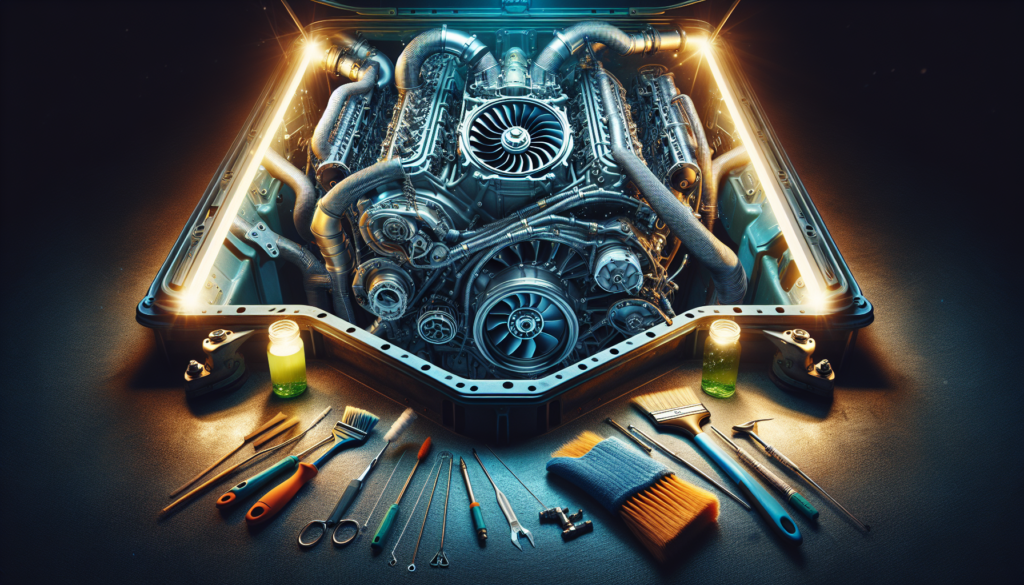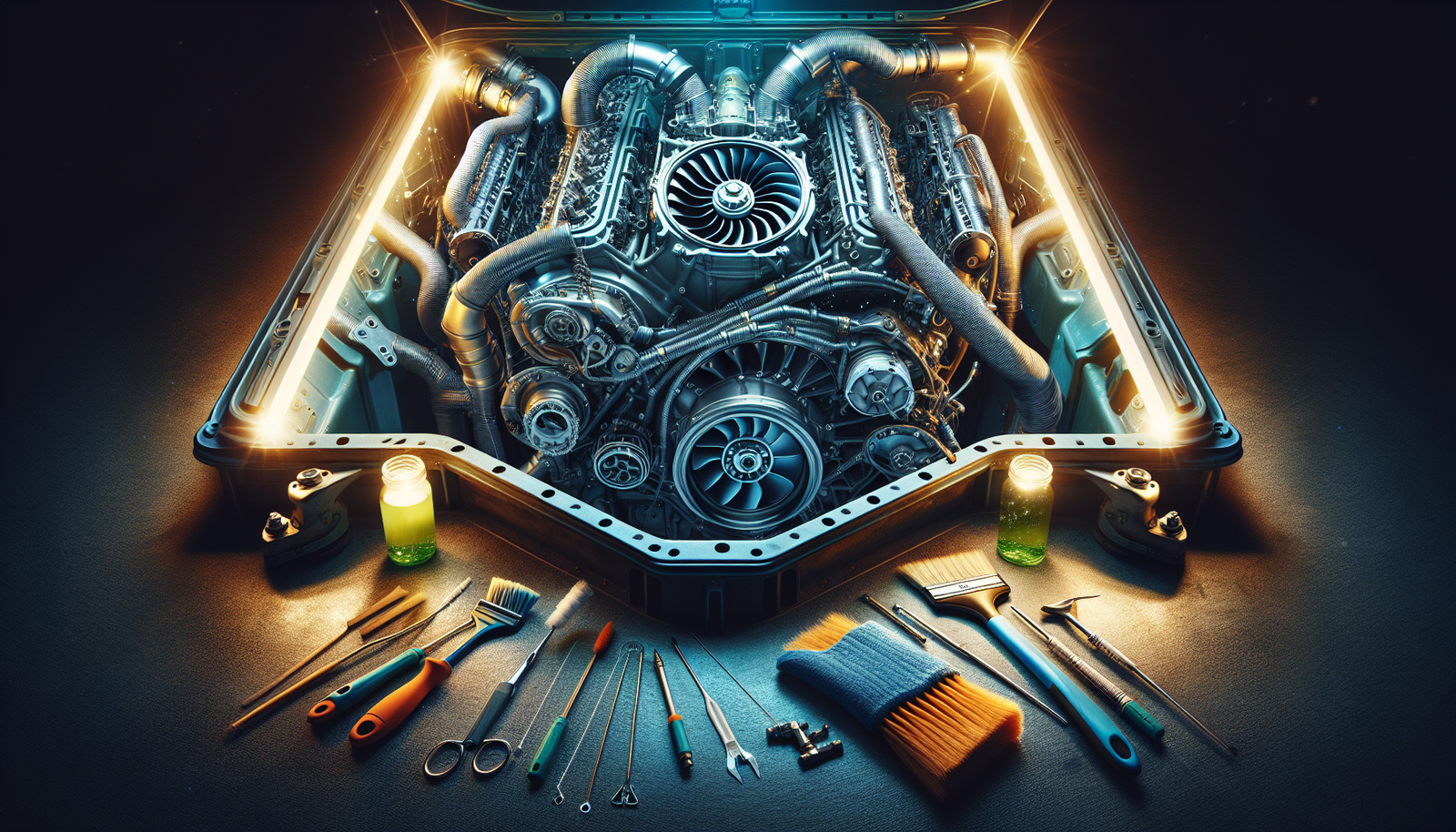As an astute boat owner, you probably take regular maintenance very serious. The heart of your vessel—the engine—requires careful attention, and one key aspect often overlooked is proper ventilation. This article, “Best Ways to Ensure Proper Ventilation in Your Boat Engine” is going to equip you with invaluable insights on how to keep your boat’s engine in optimum condition through correct ventilation techniques. Get ready to explore the vital steps towards maintaining a healthy engine, increasing the lifespan of your favorite watercraft, and ensuring smoother, safer journeys on the open waters.

Understanding the Importance of Boat Engine Ventilation
Being a boat owner means knowing the ins and outs of your watercraft, including understanding the importance of boat engine ventilation. The proper care and maintenance of your boat’s engine can ensure its longevity and reliability, making your boating experience more enjoyable and worry-free.
Purpose of a Well-ventilated Boat Engine
A well-ventilated boat engine is critical for keeping it operating at provide peak performance. A properly ventilated engine allows for the circulation of fresh air, which main purpose is to balance out the engine’s heat levels. It also prevents the accumulation of dangerous and explosive fumes that could lead to accidents. A good flow of air also makes the engine room less prone to corrosion and rust.
Consequences of Poor Boat Engine Ventilation
Insufficient or poor ventilation of your boat’s engine can lead to several issues that might cause severe damage to your boat’s functionality and lifespan. Poor ventilation might cause you costly repairs and downtimes. Overheating due to bad ventilation can lead to engine failures. Also, the accumulation of harmful exhaust gases can not only damage the engine parts but can also be a safety risk to you and your passengers.
Regular Maintenance
Just like any type of equipment, your boat’s engine needs regular maintenance to remain in good shape.
Conducting Frequent Inspections
By regularly inspecting your boat engine, you can catch small issues before they worsen. Pay detailed attention to parts related to ventilation such as ducts, blowers, and heat exchangers.
Addressing Minor Problems before they Escalate
Catching minor issues early can save you a lot of hassle down the line. You may tend to ignore minor leakages or a slightly higher engine temperature, but these seemingly small problems can escalate into major issues if not addressed immediately.
Timely Replacement of Defective Parts
Replacing defective parts on time is another crucial aspect of maintaining a boat engine. Old or worn-out parts can have a significant impact on the ventilation and overall performance of your boat’s engine.
Use of Ventilation Blowers
Ventilation blowers play a crucial role in maintaining the optimal performance of your boat’s engine.
Installation of Ventilation Blowers
Proper installation of ventilation blowers is crucial for maintaining constant airflow in your engine. These devices help circulate fresh air and expel hot or stale air from your engine room, thereby preventing overheating.
Operation and proper use of Ventilation Blowers
Learning how to operate and use ventilation blowers properly is just as important as their installation. Turning on your ventilation blowers at least four to five minutes before starting your engine can help remove any accumulated fumes or heat and provide a fresh supply of air to your engine.
Maintaining your Ventilation Blowers
Regular cleaning and checks of your ventilation blowers can extend their lifespan. Cleaning or replacing the filters regularly helps to maintain their effectiveness.

Ensuring Clean Fuel and Air Supply
For an engine to work seamlessly, it requires a constant supply of clean fuel and air.
The role of Air in Engine Ventilation
Air plays a crucial role in maintaining the temperature of the engine. Fresh air helps in cooling the engine and removing excess heat.
How clean fuel aids in Engine Ventilation
Clean fuel aids in the uninterrupted operation of the engine. Contaminated fuel can lead to inefficient combustion that in turn leads to a build-up of residual particles and waste gases. This not only affects the engine but also hampers proper ventilation.
Measures for ensuring Clean Fuel and Air Supply
Regularly checking your fuel and air filters can ensure a clean supply of air and fuel to your engine. Installing quality air filtration systems is a good practice.
Optimum Temperature Management
Managing temperature is a critical aspect of proper boat engine ventilation.
Understanding the role of temperature in engine ventilation
Overheating is a common enemy of boat owners. Too much heat can lead to engine failure. This is why temperature management is integral to boat engine ventilation.
Ways to manage and maintain optimal engine temperature
Routine checks of your engine’s cooling system, including the coolant levels and belts, can help maintain the optimal engine temperature.
Avoiding over-heating scenarios
Avoiding overheating scenarios involves more than just routine maintenance. The operation of the boat also matters. Making sure you are not always pushing your engine to its limit can help to reduce the risk of overheating.
Proper Installation of Ventilation Ducts
Ventilation ducts are a vital part of a boat engine’s ventilation system.
Importance of Ventilation Ducts
Ventilation ducts allow the constant flow of fresh air while expelling the old, stale air, ensuring the engine is adequately ventilated at all times.
Guidelines for installing Ventilation Ducts
When installing ventilation ducts, it is essential to ensure that they are placed in the right areas and are cleared of any obstructions to facilitate sufficient airflow.
Maintenance of Ventilation Ducts
Maintaining your ventilation ducts includes regular cleaning to get rid of dust or debris that can clog these airways and hamper the proper flow of air.
Exploiting the Engine’s Heat Exchangers
The heat exchangers of an engine play a vital role in the engine’s ventilation.
Understanding heat exchangers in boat engines
Heat exchangers help regulate an engine’s temperature by transferring excess heat to be expelled, thus maintaining optimal operating temperatures.
Using Heat Exchangers for better ventilation
Exploiting your heat exchangers properly can help with better ventilation. A well-working heat exchanger keeps the engine temperature in check, thus reducing any chances of overheating.
Maintenance of Heat Exchangers
Just like other components, heat exchangers need to be cleaned and inspected regularly to ensure they continue to work efficiently and contribute to proper ventilation.
Keeping the Engine Room Clean
A clean engine room is key to effective ventilation.
How an engine room’s cleanliness affects ventilation
A dirty or cluttered engine room can obstruct the airflow, which can impede ventilation and lead to unnecessary heating of the engine.
Effective ways of cleaning the engine room
Regular vacuuming, wiping with a damp cloth, and using a blower to remove the dust can keep your engine room clean.
Importance of a clutter-free engine room
A clutter-free engine room is not just aesthetically pleasing, but it also allows easy access to various engine parts for cleaning and maintenance. It also helps in unobstructed air circulation and better ventilation.
Sealing off Leaks and Drafts
Leakages and drafts can disrupt your engine’s ventilation process.
Identifying potential leaks and sources of drafts
Conduct regular inspections on seals, gaskets, and ducts to keep a watch for any signs of wear and tear or any irregularities that might point towards potential leaks or sources of drafts.
Best practices for sealing off leaks and drafts
Once the problem areas are identified, you should quickly rectify the leaks with appropriate sealants or perhaps replacing the faulty parts.
Relevance of keeping airtight seal
A well-sealed engine room reduces uncontrolled air exchange, thus regulating air circulation and controlling the engine temperature.
Educating Yourself about Boat Engine Ventilation
Being informed about your boat engine’s ventilation needs is always beneficial for your boat’s maintenance.
Understanding basic principles of engine ventilation
Learning the basic principles of engine ventilation provides the knowledge you need to maintain your boat better.
Useful resources for boat engine ventilation knowledge
There are several resources available – books, articles, online forums – where you can gain more knowledge on this topic.
Benefit of being well-informed about your boat engine’s ventilation
The more you understand about how your boat’s engine ventilation system functions, the better equipped you’ll be to address issues promptly and ensure smooth water journeys. Knowledge gives you the confidence to deal with minor ventilation issues and determines when professional help is needed.
In conclusion, a good understanding of the importance of boat engine ventilation, frequent inspections, use of ventilation blowers, ensuring clean fuel and air supply, optimum temperature management, proper installation of ventilation ducts, optimum use of the engine’s heat exchangers, maintaining a clean engine room, sealing off leaks and drafts and educating oneself about boat engine ventilation are essential for maintaining a well-ventilated boat engine.


[…] body, your boat’s engine needs to remain cool to function efficiently, and this is where the cooling system comes into play. With the article ‘How to Maintain and Clean Your Boat Engine’s Cooling […]